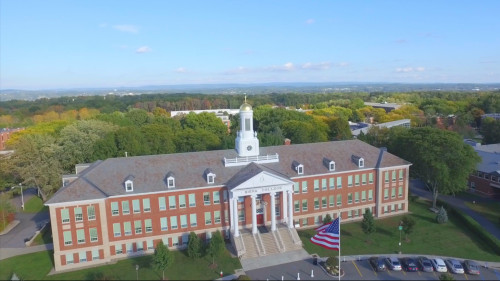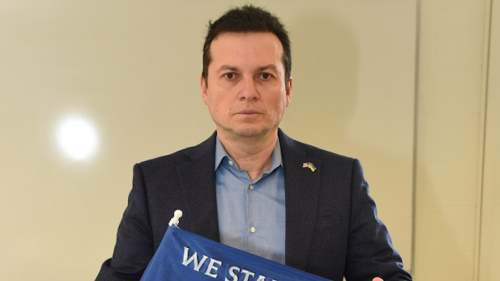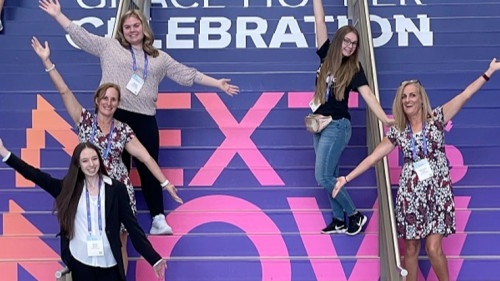
Jami Cotler, Ph.D., was curious as to why some computer science students were graduating with high GPAs and excellent technical skills but had difficulty landing jobs.
“I wondered, is there a missing piece, and is it something that can be taught?”
That led the associate professor of computer science to research social emotional intelligence, which is basically the ability to be aware of our own emotions and needs, the impact our emotions and actions have on others, and to use that information to manage ourselves and our relationships effectively.
Intrigued, Cotler began integrating some social emotional intelligence concepts into her courses. She and her students saw and remarked on the positive classroom and employability benefits, and spurred by the enthusiastic reception, she delved further into the subject and how it could benefit her students and colleagues. She recently presented on the topic at the International Conference on Higher Education Advances held in Spain, and has received a curriculum diversification fellowship through the College’s Diversity Action Committee entitled “Empathy Lab: Developing Software for All.”
What sounds like material for a psychology or wellness class can actually be integrated into any course curriculum. Developing the whole person, and building bridges with others, also reflects Siena’s Franciscan mission.
Cotler said, “It’s important whoever we are, in order to do our best work, we need to understand what our colleagues need from us and what we need from them. That starts with self-awareness, and upon that foundation we can build competencies in empathy and fellowship.”
The School of Business has taken steps to integrate the development of social emotional skills in its core curriculum. Paul Thurston, Ph.D., professor of management and department chair, explained that students have multiple opportunities to practice these skills starting with the introduction to business course and culminating in their capstone.
“We start by helping the students become aware of their own particular style of thinking and communicating, and how those styles differ from those of their classmates,” he said. “Students have an ‘aha’ moment where they realize why they have had difficulty understanding and working with others. Armed with that knowledge, we provide opportunities for them to develop productive habits that help them interact with others and work in diverse teams.”
Beth DeAngelis, senior director of the Sr. Thea Bowman Center for Women, teaches a life skills course on the subject at Siena and has guest lectured on it at conferences and at other colleges, most recently at the virtual 2022 Emotional Intelligence in Colleges and Universities Conference.
Traditionally, intelligence and social skills have been seen as two separate entities, two distinct skill sets or traits. But adherents of social emotional intelligence maintain that “abilities such self-awareness, self-regulation, social skills, motivation, and empathy enhance cognitive abilities across domains of life and also enhance better health and relationships, leadership and workplace effectiveness.” Over the past three decades the concept of social/emotional intelligence has become more accessible not only to academics, but to the general public as well.
The concept of social emotional intelligence came on the radar after Yale University President Peter Salovey and Prof. Jack Mayer of SUNY Purchase started discussing the concept as colleagues and friends in the 1980s. Daniel Goleman and other academics have written widely on the subject and how it relates to leadership, teamwork and education. Articles on the subject began appearing in academic journals, and Yale now has a center devoted to its study.
As part of Cotler’s research for her doctorate in informatics, she spoke to Siena alumni, company leaders and computer science careerists to determine what made someone attractive as a potential hire.
“If graduates have difficulties collaborating or creating synergies with colleagues, then they may not be valued as employees,” explained Cotler. “It’s not just about having the right technical skills.”
Knowing how to be self-aware, manage one’s emotions and be aware of the feelings of others can make a huge difference not only in academics and getting a career off the ground, but in personal life as well. That can include recognizing when we are stressed and dealing with it in a healthy way; asking for help when we need it; and respecting that others approach tasks in different ways are all examples.
“This is very important for the development of all students, and should be considered an important life skill,” said DeAngelis. “We’re receiving incredibly positive feedback from students who have been involved in an assessment or learning the competencies in workshops and classes.”
Developing one’s inner life is crucial for success, and as such should be an important component of a college education. A good dose of self-compassion can help us be braver about our choices in life.
“Why does it matter? So much of education is focused on the neck up,” said DeAngelis. “Developing social emotional intelligence means we are able to create more authentic and more meaningful lives for ourselves and experience higher levels of well-being. We have to know who we are to truly learn how we can be in the world.”
Thurston added, “We provide our students knowledge and technical skills that will help them solve complex problems and influence the lives of others. With power comes great responsibility. It is important that we help them develop a strong sense of empathy and the ability to be truly present to those with whom they work and those who depend on their actions.”
Cotler said social emotional intelligence is a skill we can all develop; it’s not just a personality trait of a lucky few.
“In class we talk about these skills and then we practice them a lot. One way we do this is through giving and receiving feedback and learning how to reflect on the process. This offers students an opportunity to continually learn and improve their social emotional intelligence skills.”
Faculty and administrators can become qualified to conduct EQ-i 2.0 assessments and teach these skills; students can find tools and encouragement to become their more authentic selves in professional and personal lives.
Computer science alumni Juan Acosta ’22 and Bailey Cross ’22 both called developing social-emotional intelligence competencies “critical” for college students.
“It’s important to understand your emotions and your feelings; they are equally and sometimes more important than your physical health,” said Acosta. “To be an optimal student and professional in this world you need to understand how your emotions work, and what your feelings want to communicate to you. I learned how to do this with the help of my professors, as well as going to counseling sessions and using an app called the “mood-meter.” Also, using the free resources that the school has to offer! It changed my way of living.”
Cross added, “Emphasizing social emotional intelligence within my software engineering class helped me navigate through situations smoothly from a completely different perspective.” He is now working as associate software developer at New York Independent System Operator (NYISO).
Have questions about social emotional intelligence, its assessment, or how to teach or learn competencies? Reach out to jcotler@siena.edu, pthurston@siena.edu, or bdeangelis@siena.edu.

